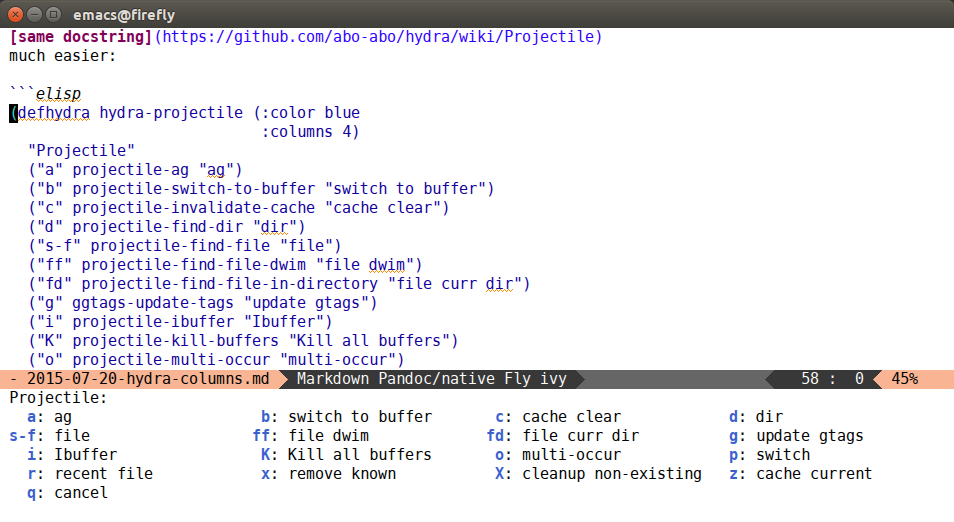Easily arrange hydra into a matrix
20 Jul 2015The new :columns option
Today I'll introduce a pretty cool new option that you can use to quickly create hydra docstrings arranged in a matrix. This, of course, was already possible before, but you had to format the matrix by-hand like this (I cite just bit instead of the full code, it was cut to fit into the Jekyll code column restriction):
(defhydra hydra-projectile (:color teal
:hint nil)
"
PROJECTILE:
Find File Search/Tags
-----------------------------------------
_s-f_: file _a_: ag
_ff_: file dwim _g_: update gtags
_fd_: file curr dir _o_: multi-occur
"
("s-f" projectile-find-file)
("a" projectile-ag)
("ff" projectile-find-file-dwim)
("fd" projectile-find-file-in-directory)
("g" ggtags-update-tags)
("o" projectile-multi-occur)
("q" nil "cancel"))
The syntax above is still very useful if you want to arrange every detail perfectly or need Ruby-style quoting. But here's the new syntax that allows to get almost the same docstring much easier:
(defhydra hydra-projectile (:color blue
:columns 4)
"Projectile"
("a" projectile-ag "ag")
("b" projectile-switch-to-buffer "switch to buffer")
("c" projectile-invalidate-cache "cache clear")
("d" projectile-find-dir "dir")
("s-f" projectile-find-file "file")
("ff" projectile-find-file-dwim "file dwim")
("fd" projectile-find-file-in-directory "file curr dir")
("g" ggtags-update-tags "update gtags")
("i" projectile-ibuffer "Ibuffer")
("K" projectile-kill-buffers "Kill all buffers")
("o" projectile-multi-occur "multi-occur")
("p" projectile-switch-project "switch")
("r" projectile-recentf "recent file")
("x" projectile-remove-known-project "remove known")
("X" projectile-cleanup-known-projects "cleanup non-existing")
("z" projectile-cache-current-file "cache current")
("q" nil "cancel"))
It still looks pretty good, in my opinion:

Note how all redundant information has been removed. Another advantage is the you can easily:
- Add/remove heads.
- Update head hints.
- Change the number of columns.
A bit of customization
After each change, just re-eval the defhydra and you're done - no
need to manually re-arrange the docstring. Since there already is an
interface that allows you to customize the docstring very precisely, I
tried to make the new interface as automatic as possible: just specify
the number of columns and you're done. But if you want just a little
bit more customization, look at this code:
(defvar hydra-key-doc-function 'hydra-key-doc-function-default
"The function for formatting key-doc pairs.")
(defun hydra-key-doc-function-default (key key-width doc doc-width)
(format (format "%%%ds: %%%ds" key-width (- -1 doc-width))
key doc))
So if you want to add a little space here and there, or e.g. wrap key
bindings in brackets, just clone hydra-key-doc-function-default,
customize it a bit and set hydra-key-doc-function to the new
function.
Outro
If you've been using just the plain style before and felt that you can't fit your docstring on one line, try the new style: it's just one line of change with respect to your old code. And if you've been building the docstring by-hand, see if it's possible to transform it to the new style: adding and removing new heads will become easier. Thanks to @Fuco1 for the suggestion in #140.
